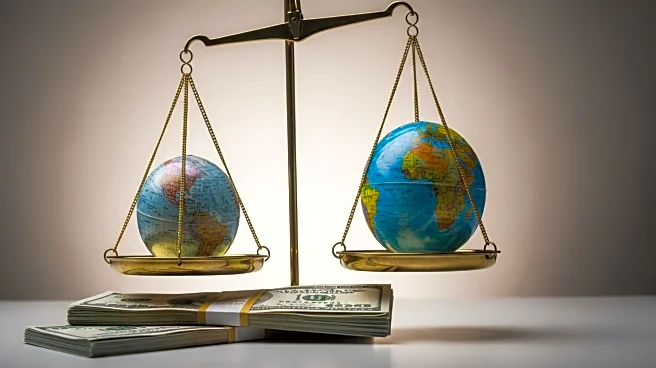What is the story about?
What's Happening?
President Trump has implemented a new round of tariffs on imported goods, which took effect recently. These tariffs are expected to increase the prices of various imported products in the United States. Economists from the Yale Budget Lab predict that prices for computers and electronics could rise by 17% in the short term and 7.7% in the long term. Clothing, another major import, could see price increases of 36.6% in the short term and 18% in the long term. Other affected goods include watches, shoes, alcohol, furniture, and toys, with varying tariff rates depending on the country of origin. Businesses have been stockpiling goods in anticipation of these tariffs, but may soon need to pass on the costs to consumers.
Why It's Important?
The tariff hikes are significant as they could lead to increased consumer prices across various sectors, affecting the cost of living for Americans. The tariffs are part of President Trump's trade strategy, which aims to protect domestic industries but may result in inflationary pressures. Industries reliant on imported goods, such as electronics and apparel, could face challenges in maintaining competitive pricing. Consumers may experience higher costs for everyday items, potentially impacting spending habits and economic growth. The tariffs also highlight ongoing trade tensions between the U.S. and other countries, particularly China, which could have broader implications for international trade relations.
What's Next?
If a trade deal is not reached with China by August 12, tariffs could increase further, exacerbating the impact on prices. Businesses may continue to adjust their strategies, potentially seeking alternative suppliers or increasing domestic production to mitigate costs. Economists predict that the full effect of tariff-related price increases may take up to eight months to be realized in consumer prices. Stakeholders, including industry leaders and policymakers, may engage in discussions to address the economic implications and explore potential solutions to ease the burden on consumers.
Beyond the Headlines
The tariff hikes raise questions about the long-term sustainability of protectionist trade policies and their impact on global trade dynamics. Ethical considerations arise regarding the balance between protecting domestic industries and ensuring affordable consumer goods. The tariffs may also influence cultural shifts, as consumers adapt to changing prices and availability of imported products. Additionally, the situation could lead to legal challenges or negotiations aimed at revising trade agreements to better align with economic interests.

















